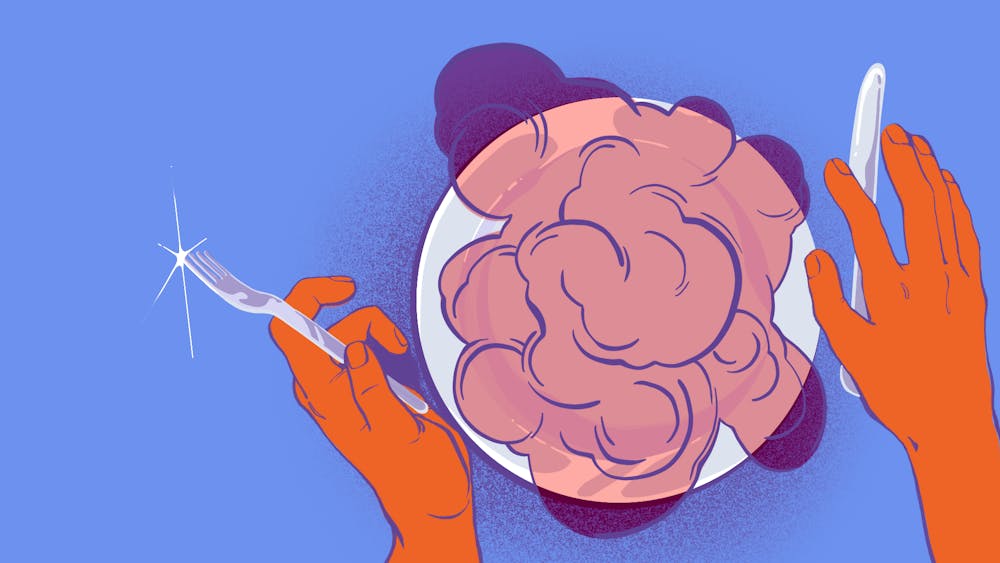
“I haven’t eaten anything all day. I’m glad the dining halls are closed, that makes it easier for me to lose weight.”
This was not the first time I had heard one of my male friends say something like this. However, it was the first time I realized that my male friends were not exempt to struggling with body image or their relationship with food just because of their gender.
When most people think of eating disorders they usually picture underweight women with an extreme desire to be beautiful. But, the truth is that everyone is vulnerable to developing eating disorders. Especially in college, a lot of students tend to fall into disordered eating, which involves similar behaviors as eating disorders but with less frequency or intensity, such as: eating or skipping meals to deal with stress, engaging in calorie restriction, binging or purging irregularly, or avoiding major food groups. The challenges of being a college student, the academic pressure, and the need to keep up with an overwhelming social life create the perfect conditions for these disorders to develop.
For a lot of students at Penn, disordered eating can result from various factors. Some may not have enough time to sit down and eat between classes, club meetings, and studying. Others forget to eat at all because we are always so caught up in work and we have gotten used to getting by only with copious amounts of coffee and energy drinks.
Additionally, the social pressure of having the “perfect body” is always present. Whether it is first years trying to avoid gaining the "Freshman 15," doing intense diets such as the eggs-only diet or intermittent fasting, or being involved in toxic gym culture, there are always spaces and openings for people to get involved in unhealthy behavior without even noticing they are.
Especially here at Penn, there is a big gym and diet culture that can be extremely toxic at times. Students will go to the gym or go on diets to try to achieve their ideal look. The problem arises when people engage in these habits without proper guidance from a nutritionist or dietician. Unfortunately, this encourages dangerously unhealthy habits, like restrictive diets, binge eating, or overexercising, which can eventually lead to more serious eating disorders.
Penn also doesn’t do much to help its students live in the healthiest environment when it comes to food. The fact that most dining halls are closed during the weekends, or that getting food on campus after 10:30 p.m. is basically impossible any day tends to encourage disordered eating among students on the meal plan.
Still, these behaviors usually go unnoticed when the people that are affected with disordered eating do not fit into the expected demographic. While guys who spend hours in the gym and follow strict diets are often praised for their dedication and considered fit, girls who engage in similar behaviors are sometimes labeled as sick. When people that are overweight get on diets, they are being healthy and losing weight, but when people that fall under the beauty standard do, they are unhealthy. However, all of these behaviors are forms of disordered eating and eating disorders. They are all dangerous and should be acknowledged and addressed equally.
Believing that eating disorders only affect a certain demographic is extremely dangerous. College students are vulnerable to disordered eating habits that can easily turn into eating disorders. Deciding to ignore that there is a problem and failing to address it could be life threatening. There are obvious things Penn can do to address the problem, like adding more time between classes at times when it is common for students to eat lunch or dinner, and having more dining options open during the weekends. Having the shortest break between classes be 15 minutes and only opening certain dining halls for limited time during the weekends does not give students enough time to eat and encourages skipping meals.
Additionally, Penn doesn’t really have a lot of good resources to help students deal with this. When looking up “Penn resources for eating disorders,” the only thing that comes up is the Center for Weight and Eating Disorders. This resource is not well known to students, and is honestly kind of confusing and intimidating when one looks at their website. A website with limited information, covered in pictures of food or people exercising, does not seem like the best resource for students that are struggling with their relationship to food and eating habits.
It is clear that Penn has to acknowledge the fact that this is a real problem students are facing, and do something about it. But while that happens, helping ourselves and others is our responsibility. So, please take a moment to reflect on your own eating habits, check on your friends, and take care of each other. If you or someone you know is struggling with disordered eating, don’t be afraid to ask for help.
Campus Resources
The HELP Line: 215-898-HELP: A 24–hour–a–day phone number for members of the Penn community who seek help in navigating Penn's resources for health and wellness.
Counseling and Psychological Services: 215-898-7021 (active 24/7): The counseling center for the University of Pennsylvania.
Student Health Service: 215-746-3535: Student Health Service can provide medical evaluations and treatment to patients with diagnosed eating disorders or who think that they might have one. Both male and female providers can perform a 30–minute examination that includes reviewing medical history, doing a physical exam, and possibly arranging for lab work or other studies needed.
Reach–A–Peer Hotline: 215-573-2727 (every day from 9 p.m. to 1 a.m.): A peer hotline to provide peer support, information, and referrals to Penn students.

ZARA TENA is a College first year studying political science from Puebla, Mexico. Her email is zaratena@sas.upenn.edu.
The Daily Pennsylvanian is an independent, student-run newspaper. Please consider making a donation to support the coverage that shapes the University. Your generosity ensures a future of strong journalism at Penn.
Donate






